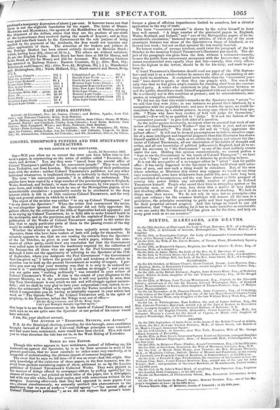NOTES BY TliE EDITOR.
Though this writer appears to have withdrawn, instead of following up, his insinuations against the Spectator, he is so far from accurate in most of his present positions, that we must conclude he either reads very carelessly, or is incapable of understanding the obvious import of common language.
The error that he says we fell into—if it was an error—had this origin. Our only knowledge of the existence of these papers, in the first instance, was de- rived from packets containing copies of them, addressed to us by the London publisher of Colonel Tnomesores Collected Works. They were ptjnited in the manner of things offered to newspaper-editors by puffing agents:10r the chance of insertion : not printed on both sides of the paper, like a ibets2aper, but with one side white, like proof-copies, and with corrections written On the margins. Learning afterwards that they had appeared in more papers Van One, almost simultaneously, we naturally ascribed this phtenomenon to the machinery that we saw at work—a" central agency "—" the central office of Colonel Thompson's publisher"; as we did not suppose that person's niter- ference a piece of officious impertinence limited to ourselves, but a circular application in the way of trade. The term "convenient journals" is shown by the writer himself to have been well earned. "A large number of the provincial papers in England, Wales, Scotland, and Ireland," and " one of the Metropolitan papery of no in- considerable circulation," hastened to copy articles, of which one of the most prominent features was abuse of the Spectator—a tissue of falsehood, as we showed last week ; but not on that account the less readily inserted.
No honest reader, of average intellect, could twist the paragraph of the lit October to the meaning Colonel Twoarsow's illustrator put upon it. The ob- ject of the paragraph was plain from the first, without a comment—namely, to save the public from unnecessary annoyance with the Income-tax : and the means recommended were equally clear and fair—namely, that every officer, from the highest to the lowest, should be fit for his duty, and made to per- form it.
Colonel THOMPSON'S illustrator should read our paper of the 17th Septem- ber—and read it as a whole—before he assume the office of expounding or set- ting forth its doctrines. It contained more truths than the "convenient jour- nals" have dared to quote, or than they can grapple with. Nor was it the only time that we had given ample reasons for standing aloof from the conven- tions of party. A writer who undertook to play the Interpreter between us and the public, should have made himself acquainted with our recorded opinions. He is evidently not in this condition at present ; and he misunderstands, mis- quotes' or misapplies, continually.
We did not say that this writer's remarks on the Spectator were " severe "— we said that they were false; in one instance we proved their falsehood, by a comparison with the ungarbled text; and were it worth the space, we could de- monstrate the same, by a similar process, in every case where he has been spe- cific. "Those who have been readers of both will judge for themselves," forsooth !—Few will be so qualified to " judge. ' It is not the fashion of the "convenient journals" to give both sides of a question. As the writer quotes incorrectly, we repeat what we asserted last week of our review of Colonel THOSIPSON'S Works—" that we think it just, and are sure it was not unfriendly." We think we did and do "fully appreciate the gallant officer." It will not be deemed presumptuous to believe ourselves capa- ble of a more intelligent and impartial judgment than this illustrator has shown himself qualified for. But, much as we admire the talents and esteem the cha- racter of Colonel THOMPSON, all our observation of his habits of thought and action, and all our knowledge of political influences in England, lead us to re- gard his accession to "the Government" as one of the most unlikely events under the sun. Holding this opinion conscientiously. we cannot profess a "hope to see the Government in the hands of Colonel Thompson": we have no such "hope," and we will not assist in delusion by pretending to have.
It is not the prerogative of a newspaper-editor to " select " men for public office: it has rarely happened to the Spectator to busy itself about such selec- tions of men, and now such a thing would be ridiculous. But, of the men whose selection as Ministers this writer may suppose we would at one time have commended, some have withdrawn from public life, some have long been self-convicted of incompetence, and the rest have almost as little prospect of coming into power within any calculable number of years as Colonel Tnosirsow himself. People who spend their lives in struggling against or foe particular men, or sets of men, may deem this a matter of very doleful and shocking auction. To us it is not so very sad or shocking. We look to things more than names. We do not rely on men, but on principles—the only just reliance ; for the common destroyer will remove all the men in a generation, the principles remaining to guide and bind together generations for their perpetual onward progress. And this brings us round to our old conclusion, that "there is nothing for it but to make ourselves as comfortable as we can under the Government God has given us for the time, and help on every good work as we see occasion."


























 Previous page
Previous page